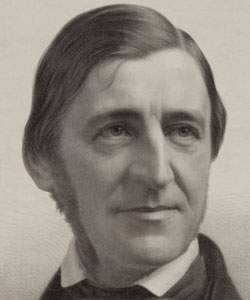Ralph Waldo Emerson (American National Biography)
Scholarship
During his life Emerson exerted great influence on his contemporaries, both by his financial support of them, as in the cases of Alcott and Ellery Channing, and by his intellectual companionship, as in the case of his Concord neighbor [Henry David] Thoreau. His discussions of organic form (everything proceeds from a natural order, followed by but not imposed upon by man), self-reliance, optimism (evil does not exist as an actual force, merely being the absence of good), compensation, universal unity (or the over-soul), and the importance of individual moral insight were all influential in forming the literature and philosophy of nineteenth-century America. In literature, too, Emerson was an important force, and his organic theory of poetry ("it is not metres, but a metre-making argument that makes a poem") and his view of poets as "liberating gods" or prophets did much to counteract the poetic conservatism of his day and helped lead the way to the experimental verse of Walt Whitman, who once hailed Emerson as his master.
The later nineteenth century embraced Emerson as an establishment figure. His publishers (Houghton, Mifflin) marketed him as a "standard" author; his biographers, including Oliver Wendell Holmes, presented him as a promoter of Boston Brahmin values; Friedrich Nietzsche appropriated Emerson's ideas for his own concept of the "superman"; and the industrial capitalists of the Gilded Age used their interpretation of the concept of self-reliance to justify their economic version of a Darwinian "survival of the fittest."
The later nineteenth century embraced Emerson as an establishment figure. His publishers (Houghton, Mifflin) marketed him as a "standard" author; his biographers, including Oliver Wendell Holmes, presented him as a promoter of Boston Brahmin values; Friedrich Nietzsche appropriated Emerson's ideas for his own concept of the "superman"; and the industrial capitalists of the Gilded Age used their interpretation of the concept of self-reliance to justify their economic version of a Darwinian "survival of the fittest."
Joel Myerson, "Emerson, Ralph Waldo," American National Biography Online, February 2000,http://www.anb.org/articles/16/16-00508.html.





